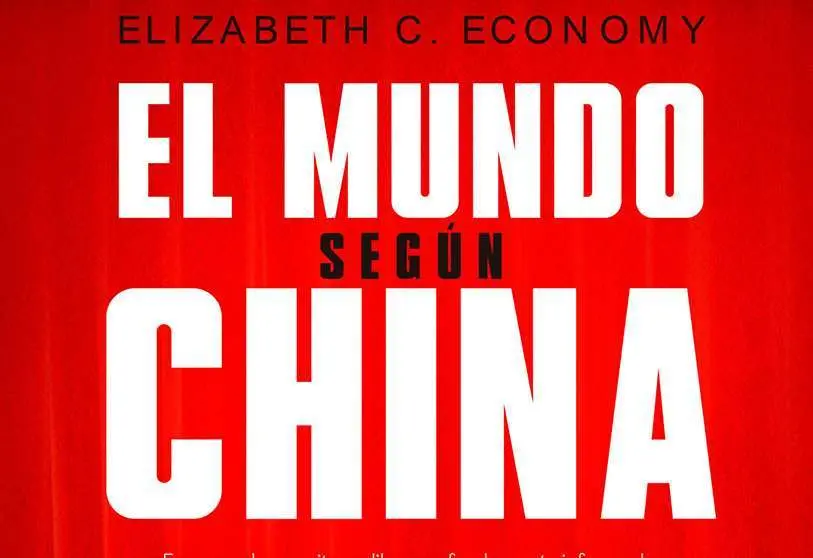The world according to China

In a few years, the size of China's economy will surpass that of the United States, its population is already four times larger and its military disadvantage is shrinking rapidly. In Beijing, the shift in the balance of power is seen as inevitable, and Xi Jinping is determined to strengthen the Asian giant's ambition to reshape the world order. Is China ready for global hegemony? What might be the next step for the Chinese regime?
Elizabeth Economy, an expert on Chinese affairs and advisor to the Biden Administration, has written "The World According to China", a documented analysis of the Chinese leadership's outlook and its aggressive soft, sharp and hard power policies. She argues that China, as a result of the contradictions of its authoritarianism, is facing enormous difficulties for its international interests, but has by no means abjured the use of force in the future. However, the United States cannot afford an escalation of direct rivalry and brute force.
It needs to abandon its retreat and lead a new, expanded multilateralism, based on the values of liberal democracy.
The General Secretary of the Chinese Communist Party and President of China, Xi Jinping, seized the occasion well. He was speaking by videoconference at the opening ceremony of the UN World Health Assembly on 18 May 2020 and offered two billion dollars for a global response to the COVID-19 pandemic. The virus had first come to international attention when it emerged in China and was now ravaging the rest of the world. China had largely managed to contain the spread. Daily life had quickly returned to normal and Xi was ready to help other countries in need. He promised that when China had its vaccine ready, his country would make it a "global public good". And, in a gesture of goodwill in the face of increasingly pressing demands from more than 120-20 countries to launch an international investigation into the origins of the virus - a demand that China had so far resisted - Xi declared his support for "a comprehensive review of the global response to COVID-19". It was a deft move aimed at certifying that China would not be singled out in an international investigation and that any subsequent report would include a description of Beijing's impressive success in containing the virus. It was also a personal diplomatic coup for a cornered Xi: his speech was reminiscent of his great successes at Davos (in January 2017), when he pledged to defend the Paris Agreement on climate change.

And his rhetoric of condescending magnanimity placed China once again in stark contrast to the United States, whose president at the time, Donald Trump, had questioned the viability of the World Trade Organisation, withdrawn from the Paris Agreement and announced, only a month before Xi's speech to the Assembly, that the US would withdraw any funding for the World Health Organisation (WHO).
Had Xi Jinping's pledges to the UN assembly been a compendium of China's foreign policy in the course of the pandemic, the rest of the world might have left the room confident that the new global leader needed for the 21st century had been found. But China's diplomacy during the pandemic is not just a story about the recent emergence of a global power taking responsibility for dealing with a humanitarian crisis. It is also the canary in the mine, the alarm bell, a warning of the potential challenge of China's ambition and the harbinger of a growing influence on the existing international system and the institutions, values and norms that have underpinned it for more than seventy-five years.
Xi's ambition, as his words and deeds over the past decade suggest, is to reshape the world order. His call for a "great renaissance of the Chinese nation" envisages China regaining centrality on the international stage: it has reclaimed disputed territories, assumed a pre-eminent position in the Asia-Pacific region, ensured that other countries align with its political, economic and security interests, provided the world with the technological infrastructure for the 21st century, and forced norms, values and standards into international laws and institutions. The road to achieving the position of centrality it seeks is an arduous one. It requires confronting both the position of the United States, the world's dominant power, and the international institutions and arrangements that have been in place since the end of World War II.
To achieve his goals, Xi has transformed China's business methods on the global stage. He has developed a strategy that reflects his model of internal governance: a highly centralised state party system that prioritises the preservation of its own power. To this end, Xi has mobilised and deployed all kinds of political, economic and military resources to reinforce his strategic priorities in a multiplicity of arenas: within China, in other countries, and in the institutions of international governance and control. He has also sought to control the content and flow of information - both within China and to other international actors - to conform to Beijing's values and priorities. Moreover, the Chinese Communist Party has infiltrated foreign societies and economies to shape the economic and political decisions of international actors to its liking in the same way it does with domestic individuals and entities. Moreover, Xi has taken advantage of the vast economic opportunities offered by China's huge market to promote and compel others to adopt his ideas and further his political interests. And finally, Xi's model is underpinned by the tremendous strength of an increasingly large and powerful Chinese military.
Will they succeed?








